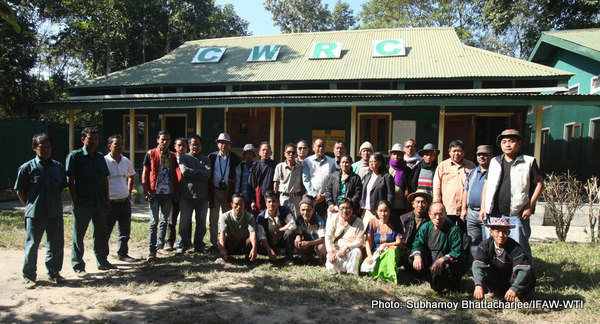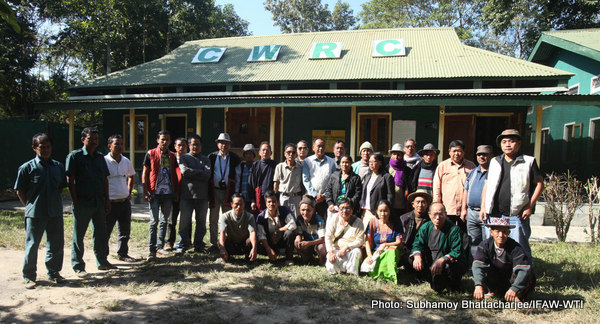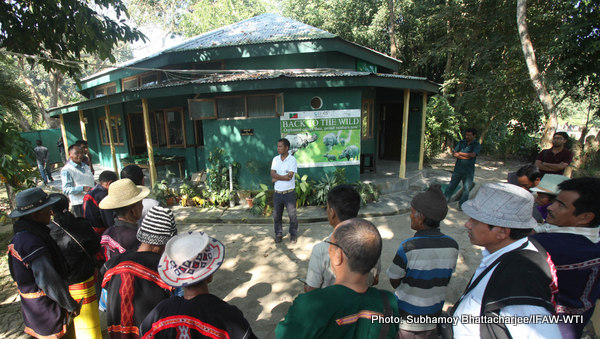Adi Tribe in Arunachal Pradesh Puts Restrictions on Hunting and Fishing
Pasighat, December 24, 2015: The Adi tribe is the second most populous tribe and inhabits six districts of Arunachal Pradesh in north-east India. A major collective tribe living in the Himalayan hills, the Adis have been traditionally hunting wild animals en masse during their festivals, especially during Dorung in November, Unying or Aran in March and Dishang in January. In addition to this, hunting during weddings is also carried out throughout the year.
One of the country’s biodiversity hotspots, the pristine forests of the state boast of rich diversity of species, many of which are threatened, endangered or close to extinction in wild. However, unabated hunting practices have threatened the existence of these species which have seen a considerable decline over the years.
Disturbed by the loss of wildlife at such rapid pace, the Adi Baane Kebang (ABK), the Traditional Apex, Appellate & Supreme Council of the Adis, is keen on stopping these hunting rituals and wants to sensitize the Adis on becoming signatories to a resolution banning these hunts. With the intent to sensitize people, the ABK proposed a Rapid Action Project (RAP) to ensure that unabated hunting of wildlife is stopped through a series of awareness programmes. There are over a thousand Adi villages in the landscape and ABK wanted to reach out to all of them to ensure that hunting is brought down substantially.
The RAP was sanctioned to ABK in October 2015 after which they started to mobilise support for conducting such awareness drives in 60 villages, which were further divided into 10 blocks. The first phase will address these 10 blocks. During the course of these meetings, the ABK will request villagers for their cooperation in enforcing a series of fines for poaching that have already been passed in the Adi Customary Laws. Moreover, ABK members will address each block of villages along with Forest Department Officials.
The village heads known as gaon burrahs will be signatories of the resolution banning hunting as representatives of their respective villages. The people will also be encouraged to surrender their locally made guns, traps and weaponry used for hunting to the Forest Department. Submission of guns has been carried out with great success in the past around the D’Ering Wildlife Sanctuary in Arunachal Pradesh. The gaon burrahs will also be given the ability to fine anyone breaking the mentioned rules. Money from these fines will go towards the development of the village itself, thus ensuring an incentive to the people to nab poachers and protect their lands.
Thereafter, WTI team had few meetings with the tribal leaders and after the monsoons the first phase of programme was set in motion. Carrying it forward, the first sensitisation programme was held in Mebo village on the October 18, 2015 which saw participation from villagers of Ayeng, Siluk, Aohali, Sigar, Motum and Ralling. Soon after that meetings were held in Ruskin village on October 24, 2015, and Monku village on October 31, 2015, that covered 15 villages.
During the course of these meetings, ABK leaders addressed villagers informing them on the need to conserve wildlife. The Divisional Forest Officer of Pasighat also appealed to the people to stop their mass hunting practices, highlighting the many endemic and endangered species found in the region. Gaon burrahs also expressed their views supporting the resolution to ban all hunting. The interactive sessions were then followed by the gaon burrahs becoming signatories to the resolution.
In addition, the Forest Department took 50 of the gaon burrahs to Kaziranga National Park to enlighten them on the various conservation activities being carried out in the landscape and how they are benefitting the local populace. The gaon burrahs appreciated the efforts of all stakeholders, especially Forest Department and WTI, and expressed willingness to take the message of conservation to their respective villages.
In addition to this, a blanket ban on use, storage and selling of air gun. Hunting and fishing by blasting, poison, electric current are completely banned and a fine of Rs 25,000 will be imposed. Forest hunting is not open, hunting in traditional way is allowed for only 2-3 days. There are several other provisions where fines have been introduced to stop hunting in the Adi belt.











